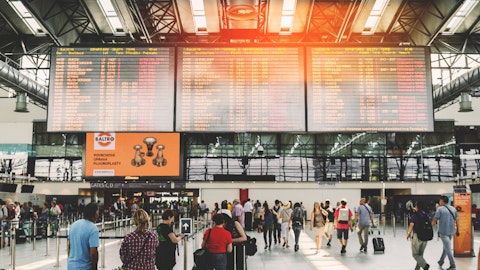We have a solid plan with solid actions that we are all committed to and it’s comprehensive. And it all drives towards restoring our financial returns and hitting our ROIC targets. We are committed to continued network adjustments to specifically address underperforming markets. We’re committed to adjusting our capacity and managing down CapEx, as we just talked about, or created — we’re committed to creating capacity through initiatives like the turn reduction and the red-eye flying because that creates capacity while spending a dollar on aircraft. We’re committed to enhancing our revenue performance and our demand through tuning our RM system and the major marketing efforts that Ryan has underway to drive demand and loyalty. We’re committed to offsetting our cost pressures through efficiency efforts and programs to reduce headcount.
We’re going to be down 2,000 this year, down further next year, and we’re down close to another 800 right now on top of that through these voluntary time off programs and we’re committed to a set of new strategic initiatives. I’ve hinted it, boarding and seating and the cabin, and we’re going to share those with you at Investor Day.
Jamie Baker: Bob, thank you very much for that answer. I appreciate it greatly. Take care.
Robert Jordan: You’re welcome.
Operator: There’s time for one more question. It will come from Savi Syth with Raymond James. Please go ahead.
Savanthi Syth: Hey, good morning. If I might, just on the business revenue, that was a good performance here. I was curious what your to 2Q outlook is reflecting in terms of expectations and what you’re seeing there?
Ryan Green: Hey, Savi, yes, managed business was up very healthy in the first quarter, up 25% and reached a significant milestone in getting back to flat to 2019 levels. So we were really pleased. With that, that was driven by a double-digit increase in unique travelers traveling under a contract in the managed business space. So that just means we’re penetrating deeper into accounts. We’re growing the number of companies under accounts, and we continue to pick up market share there. As we look forward, we expect the performance to continue and to accelerate the sequential performance in the second quarter to be better than the first. And it’s kind of — it’s across the board. Our top 15 industries, 11 of those had double-digit growth year-over-year. So, the performance is widespread, and we expect it to continue and to help our revenue performance as we go forward.
Savanthi Syth: That’s helpful. If I might just ask just question related to CapEx. And just given your current outlook, talk Tammy, on kind of free cash flow generation here and kind of looking forward a little bit, what’s realistic?
Tammy Romo: Yes, hi, Savi. We’re — as we said, we’re expecting CapEx this year at $2.5 billion and that includes about $1 billion in aircraft spend. We are working through our plans for next year. So it’s a bit early to give you guidance for next year. Obviously, we’re working through that actively now. So we’ll update you on our CapEx spending plans as part of our comprehensive update in September at our Investor Day.
Savanthi Syth: Is the view that kind of is free cash flow generation important and possible? Or how are you thinking about kind of translating that CapEx into?
Tammy Romo: We are absolutely working with the view to generate free cash flow. We — that will obviously be part of the equation as we pull together our plan for next year.
Savanthi Syth: Appreciate it. Thank you.
Tammy Romo: Okay. That wraps up the analyst portion of today’s call. I appreciate everyone joining, and have a great day.
Operator: Ladies and gentlemen, we will now transition to our media portion of today’s call. Ms. Whitney Eichinger, Chief Communications Officer, leads us off. Please go ahead, Whitney.
Whitney Eichinger: Thanks, Gary. Welcome to the media on our call today. Before we begin taking your questions, Gary, could you remind us and share instructions on how to queue up for question?
Operator: [Operator Instructions]. And the first question comes from Alexandria Skores with the Dallas Morning News.
Alexandria Skores: Hello?
A – Robert Jordan: Hello. Yes.
Alexandria Skores: Can you all hear me? Okay, perfect. I’m wondering if we could hone in on the four airports that were announced today that would be kite and same less Atlanta and Chicago that are being reduced in flight. Could you talk a little bit about the decision to — for those specific airports to be chosen?
Robert Jordan: Well, it’s never — I’ll just start with this. It’s never an easy decision to close a station or to materially reduce flights in the station. We love our airports. We serve our communities, and so it’s always difficult. But again, I’ll just go back to we have portions of the network a higher-than-normal portion of the network that’s just not performing to the level that we need. And for a variety of reasons. And so we need to hit our financial returns, and we will. And so you have to make the tough decision to continue working down the level of markets that aren’t performing. So it was really that. It’s just as we look at — as we look at our network, it really relates to the areas that are just don’t have a path to the level of financial performance that we need. That’s really the basis for the decision. I don’t know, Ryan, if you want to add anything else or Andrew?
Ryan Green: No, you covered it, I think.
Alexandria Skores: And my second question, what kind of communications have been given to the employees at those airports.
Robert Jordan: We have a very — as you would expect, we take care of our employees, we take care of our partners, and we have a very rich communication plan that to go in the right order to make sure we communicate with folks it’s done with compassion. Our employees will be offered jobs in other cities. And so they have a lot of options. But no, we handled all this, as you would expect, Southwest Airlines to handle it.
Andrew Watterson: We staged senior leaders there last night. So a very early morning hours, our people — our leaders were there to explain the wise to the employees as well as to the airports and then also to go through with them the different options they’ll have for moving it’s a seniority-based system with our unions and so how that will all work for them. And so they’ve gone through that. There’s obviously a range of emotions. People chose to relocate there, and so they will have some natural disappointment in the short term, but these people have long careers in Southwest Airlines that our ground employees tend to move around a decent amount anyway. So we expect most of them to take advantage of not all of the opportunities to relocate to other stations.
Alexandria Skores: Got it. So that’s every employee that’s impacted is going to be offering some sort of job.
Andrew Watterson: Yes. They were an employee, they choose to do so.
Alexandria Skores: Got it. Thank you.
Operator: The next question is from Mary Schlangenstein with Bloomberg News. Please go ahead.
Mary Schlangenstein: I appreciate it. I wanted to see if you could talk about the extent of the reductions in O’Hare and Atlanta?
Andrew Watterson: There are about — we took about half of a here down of about 30 something flights, about 15, 18 flights on the season day of week. So it’s about a 50% reductions at in Atlanta. I can be on the top of my head, Ryan, it was 30%. I want to say the third [indiscernible] it’s unfortunate we had been restoring Atlanta over the course of post-pandemic. We could never quite get back to the level of performance we needed at the scale we needed and so it’s been reduced back down to a level, so just shortly coming out of the pandemic. And so it’s still substantial activity there. It’s just not as big as it was before.
Mary Schlangenstein: Great. And if you could also address the impact of the new refund policies that were announced by the DOT yesterday, whether that’s going to be a financial problem for Southwest? Or and if you expect to have any trouble complying with those new rules?
Ryan Green: Hey, Mary, it’s Ryan. Well, it’s new. As you know, it was just issued yesterday. So we’re digesting exactly what all of that means. But based on our read so far, I don’t expect that it’s going to be a significant impact. Of course, we already have the most customer-friendly policies in the industry. So we’re best positioned to comply with any of these new regulations out of the gate. And today, if there’s a long delay or a cancellation, customers can receive a refund from Southwest. So there’s no real change there from our standpoint. And then, of course, unique in the industry, flight credits don’t expire with Southwest, if you have to cancel your flight for any reason. But in general, we’re proud to be unique among airlines in having these customer-friendly policies, no bag fees, no change fees, flight credits don’t expire, we don’t nickel and dime customers.
But the — those are our choices without government intervention. And it shows the marketplace works as consumers want different choices in who they fly. So again, I’d just point to the fact that we have the most customer-friendly policies in the industry, and I just don’t see a tremendous amount of impact to Southwest from these.
Mary Schlangenstein: Okay. Thank you.
Operator: The next question is from Alison Sider with Wall Street Journal. Please go ahead.
Alison Sider: Hey, thank you so much. I know that the overall demand environment remains very strong. But I am curious if you’re seeing any indications of book away or traveler nervousness about Boeing or air safety more broadly?
Robert Jordan: We — I’ll just give you a little overview and then obviously, Ryan can jump in. We — this is something that we look at. So we study, we survey to understand our customers’ views and whether anything that’s going on impacts their view of Southwest or the industry generally. That’s not perfect, but we don’t see any — we don’t see an indication that this is having an impact on bookings or demand. It’s not perfect. I think logic would tell you there could be something there. But certainly, we don’t see anything of material right.
Ryan Green: Yes. The only other thing that I would add is that we certainly are serving on the front end to see how top of mind it is for consumers when they’re making a booking, and then we also look at cancellations and ask customers once they cancel a flight, what their reasons for cancellations were and safety concerns or a Boeing aircraft as a result of that on the cancellation side is 1% of our cancellation. So it’s a very, very small number not material, I don’t think, to the overall picture.
Alison Sider: Interesting. And the four cities, the four markets that you’re exiting, are those cities that you think would have been more successful if you had the MAX 7 in your fleet or had it coming soon?
Ryan Green: I think the markets themselves were just performing at a level that we needed to make the tough choice to remove them from the network. And I don’t think that a smaller aircraft would have had a material difference on those markets.
Operator: The next question is from Dawn Gilbertson with Wall Street Journal. Please go ahead.





